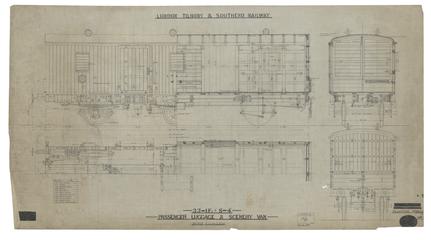
Plaistow Locomotive Works
In 1879 the Plaistow Works was set up to supply the London, Tilbury and Southend Railway (LTSR) with locomotives and rolling stock. Initially some 4-4-2 tank locomotives were supplied by Sharp, Stewart & Co Ltd, gradually supplanting those supplied by the GER. The workshops were built by Kirk & Parry of Sleaford and were fully operational by 1881.
In 1879 Thomas Whitelegg (c1841-1911) from the Great Eastern Railway Works at Stratford was appointed Locomotive, Carriage & Wagon and Marine Superintendent at the Plaistow Works of the LTSR. He remained in this position until retirement in June 1910, when he was succeeded by his son, Robert Harben Whitelegg (1871-1957). Thomas had been a draughtsman at Stratford and Robert followed the same trade, joining the LTSR as draughtsman in 1888. The locomotive works did not build its own locomotives, which were purchased from outside contractors, but did carry out extensive repair and rebuilding work. From 1923 some types of locomotives were built for the London Tilbury and Southend Section by the LMS Works at Derby.
The works complex in 1912 consisted of a small Locomotive Works (including an erecting shop, boiler shop and machine shop), a Carriage and Wagon Paint Shop (converted from the old C&W shops) and a Carriage and Wagon Shops building that had once been the locomotive running shed. The overall set-up was cramped and confined.
Essentially reduced to a local maintenance role, the locomotive works at Plaistow were closed in 1925 by the London Midland and Scottish Railway, and any work transferred to the Bow Works of the former North London Railway. The Carriage and Wagon shops continued until 1931 when their work and some staff were transferred to Wolverton.